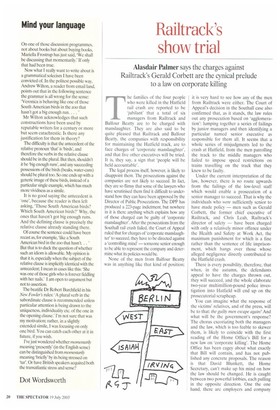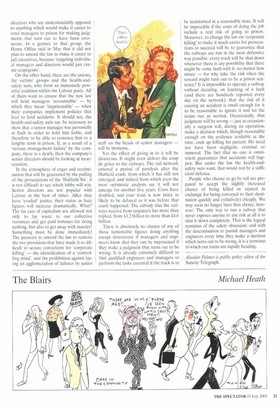Railtrack's show trial
Alasdair Palmer says the charges against Railtrack's Gerald Corbett are the cynical prelude to a law on corporate killing
The families of the four people who were killed in the Hatfield rail crash are reported to be 'jubilant' that a total of six managers from Railtrack and Balfour Beatty are to be charged with manslaughter. They are also said to be quite pleased that Railtrack and Balfour Beatty, the companies with responsibility for maintaining the Hatfield track, are to face charges of 'corporate manslaughter', and that five other executives will be tried. It is, they say, a sign that 'people will be held accountable'.
The legal process itself, however, is likely to disappoint them. The prosecutions against the companies are not likely to succeed. In fact, they are so flimsy that some of the lawyers who have scrutinised them find it difficult to understand how they can have been approved by the Director of Public Prosecutions. The DPP has produced a 223-page indictment, but nowhere in it is there anything which explains how any of those charged can be guilty of 'corporate manslaughter'. After the prosecutions from the Southall rail crash failed, the Court of Appeal ruled that for charges of 'corporate manslaughter' to succeed, they have to be directed against a 'controlling mind' — someone senior enough to be able to represent the company and determine what its policies would be.
None of the men from Balfour Beatty was in anything like that kind of position;
it is very hard to see how any of the men from Railtrack were either. The Court of Appeal's decision in the Southall case also confirmed that, as it stands, the law rules out any prosecution based on 'agglomeration': lumping together a series of failings by junior managers and then identifying a particular named senior executive as responsible for them all. It seems that a whole series of misjudgments led to the crash at Hatfield, from the men patrolling the track to the middle managers who failed to impose speed restrictions on trains travelling on the track that they knew to be faulty.
Under the current interpretation of the law, however, there is no route upwards from the failings of the low-level staff which would enable a prosecution of a senior manager to succeed. That is why the individuals who were sufficiently senior to have made policy — men such as Gerald Corbett, the former chief executive of Railtrack, and Chris Leah, Railtrack's director of safety — have been charged with only a relatively minor offence under the Health and Safety at Work Act, the maximum punishment for which is a fine rather than the sentence of life imprisonment, which hangs over those whose alleged negligence directly contributed to the Hatfield crash.
There is every possibility, therefore, that when, in the autumn, the defendants appeal to have the charges thrown out, they will succeed, and the whole elaborate two-year multimillion-pound police investigation into Hatfield will end up on the prosecutorial scrapheap.
You can imagine what the response of the victims' relatives, and of the press, will he to that: the guilty men escape again! And what will be the government's response? The chorus excoriating both the managers and the law, which is too feeble to skewer them, is likely to coincide with the first reading of the Home Office's Bill for a new law on 'corporate killing'. The Home Office has been cagey about what exactly that Bill will contain, and has not published any concrete proposals. The reason is that David Blunkett, the Home Secretary, can't make up his mind on how the law should be changed. He is caught between two powerful lobbies, each pulling in the opposite direction. One the one hand, there are employers and company
directors who are understandably opposed to anything which would make it easier to send managers to prison for making judgments that turn out to have been erroneous. In a gesture to that group. the Home Office said in May that it did not plan to amend the law to make it easier to jail executives, because 'targeting individual managers and directors would just create scapegoats'.
On the other hand, there are the unions, the victims' groups and the health-andsafety nuts, who form an immensely powerful coalition within the Labour party. All of them want to ensure that the new law will hold managers 'accountable' — by which they mean Imprisonable' — when their companies implement policies that lead to fatal accidents. It should not, the health-and-safety nuts say, be necessary to show that a senior manager was personally at fault in order to hold him liable, and therefore to be able to sentence him to a lengthy term in prison. If, as a result of a 'serious management failure' by the company. there is a death, then the company's senior directors should be looking at incarceration.
In the atmosphere of anger and recrimination that will be generated by the pulling of the prosecutions of the 'Hatfield Six', it is not difficult to see which lobby will win. Senior directors are not popular with Labour at the best of times. After they have 'evaded' justice, their status as hate figures will increase dramatically. What? The fat cats of capitalism are allowed not only to lay waste to our collective resources and get paid fortunes for doing nothing, but also to get away with murder! Something must be done immediately! The pressure to amend the law to remove the two provisions that have made it so difficult to secure convictions for 'corporate — the identification of a 'controlling mind', and the prohibition against laying an agglomeration of failures by junior staff on the heads of senior managers — will be immense.
Yet the effect of giving in to it will be disastrous. It might even deliver the coup de grace to the railways. The rail network entered a period of paralysis after the Hatfield crash, from which it has still not emerged, and indeed from which even the most optimistic analysts say it will not emerge for another five years. Costs have doubled, and your train is now twice as likely to be delayed as it was before that crash happened. The subsidy that the railways receive from taxpayers has more than tripled, from £1.2 billion to more than £4.6 billion.
There is absolutely no chance of any of those lamentable figures doing anything except deteriorate if managers and engineers know that they can be imprisoned if they make a judgment that turns out to be wrong. It is already extremely difficult to find qualified engineers and managers to perform the tasks essential if the track is to be maintained in a reasonable state. It will be impossible if the costs of doing the job include a real risk of going to prison. Moreover, to change the law on 'corporate killing' to make it much easier for prosecutions to succeed will be to guarantee that the railways are run in the most defensive way possible: every track will be shut down whenever there is any possibility that there might be some fault with it, no matter how minor — for why take the risk when the reward might turn out to be a prison sentence? It is impossible to operate a railway without deciding, on learning of a fault (and there are hundreds reported every day on the network), that the risk of it causing an accident is small enough for it to be reasonable to ignore it and let the trains run as normal. Occasionally, that judgment will be wrong — just as occasionally a surgeon will, during an operation, make a decision which, though reasonable enough on the evidence available at the time, ends up killing his patient. He need not have been negligent, criminal or immoral. The fact that no one is omniscient guarantees that accidents will happen. But under the law the health-andsafety nuts want, that would not be a sufficient defence.
People who choose to go by rail are prepared to accept the slightly increased chance of being killed or injured in exchange for being conveyed to their destination quickly and (relatively) cheaply. We may soon no longer have that choice. however. The only way to run a railway that never exposes anyone to any risk at all is to shut it down completely. That is the logical terminus of the safety obsession; and with the determination to punish managers and engineers every time they make a decision which turns out to be wrong, it is a terminus to which our trains are rapidly heading.
Alasdair Palmer is public policy editor of the Sunday Telegraph.



























































 Previous page
Previous page